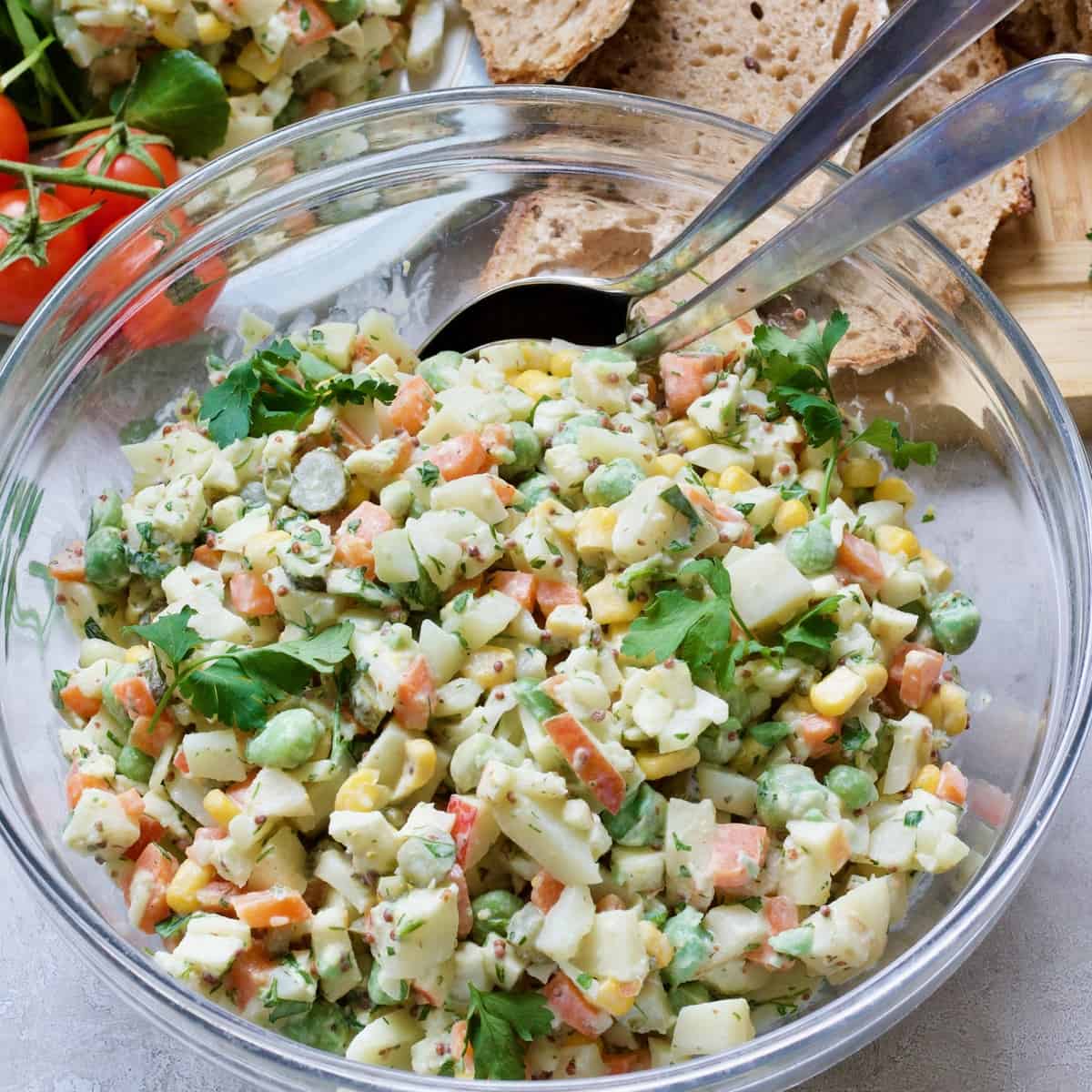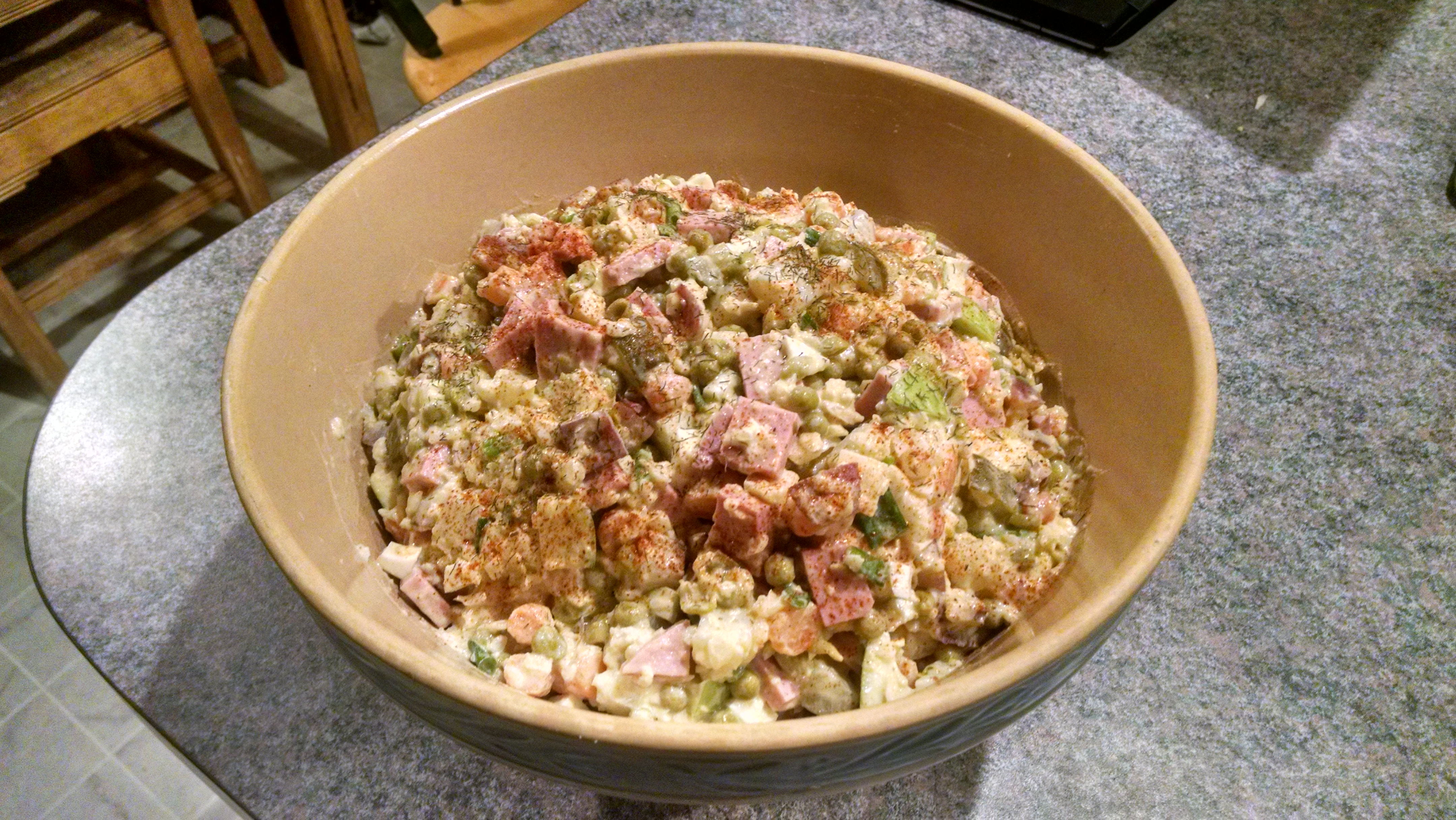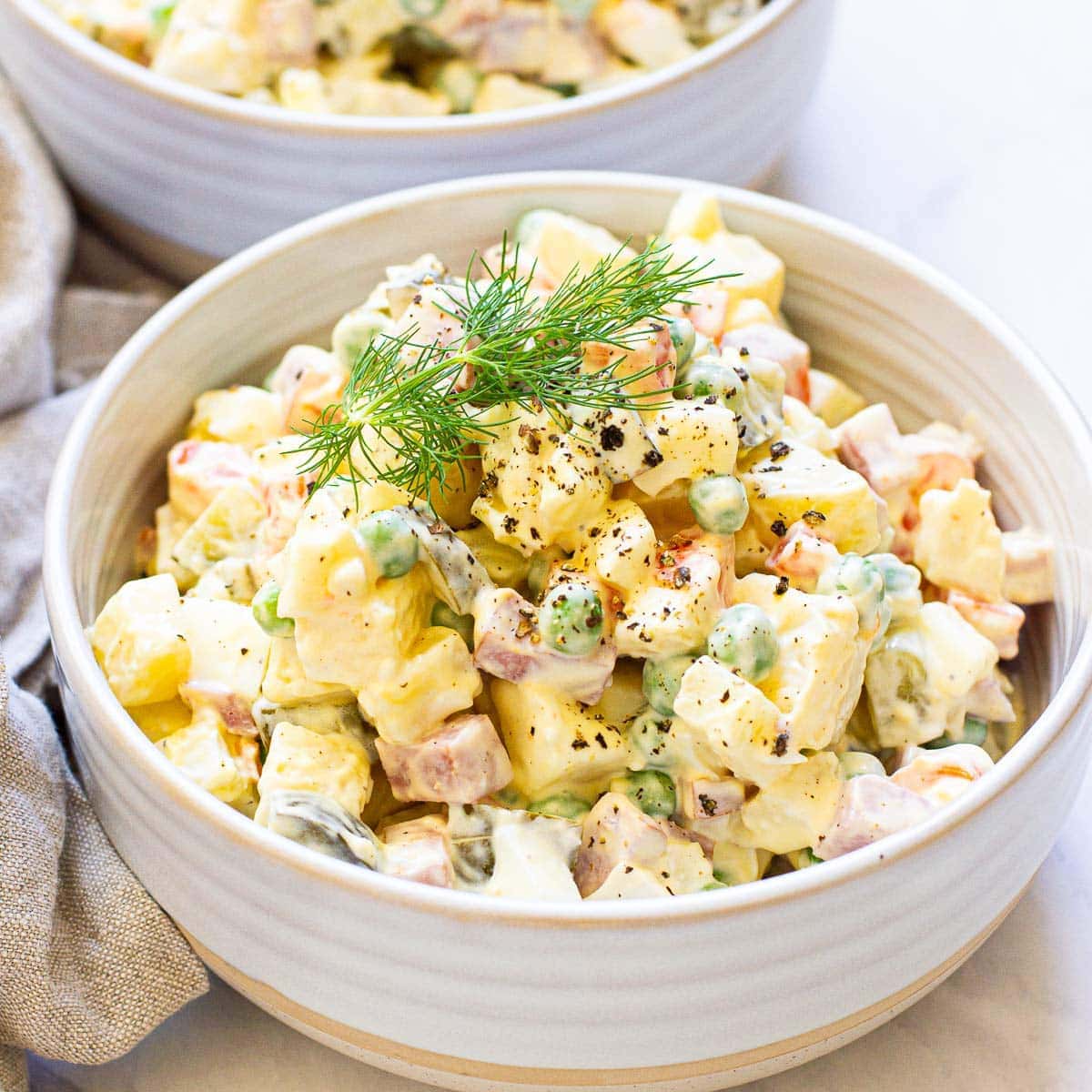Olivier Salad: A Culinary Journey into Russian Tradition

Traditional Russian Olivier Salad. Stock Image – Image of sausage – Source www.dreamstime.com
Editor’s Note: Olivier Salad: A Classic Russian Delight. Published today. Understanding the cultural and culinary significance of Olivier Salad, a beloved Russian dish.
Through extensive analysis and research, we present this comprehensive guide to unveil the魅力 of Olivier Salad. Dive into the history, preparation, variations, and cultural impact of this iconic dish, and discover why it holds a special place in Russian hearts.
Key Differences: Olivier Salad vs. Other Salads
| Characteristic | Olivier Salad | Other Salads |
|---|---|---|
| Origin | Russia | Various origins |
| Main Ingredients | Potatoes, carrots, pickles, eggs, meat (usually chicken or beef) | Varies widely based on type of salad |
| Dressing | Mayonnaise | Varies (e.g., vinaigrette, ranch, thousand island) |
| Presentation | Typically served cold, decorated with fresh herbs or pickles | Varies based on salad type |
| Cultural Significance | Associated with Russian holidays and celebrations | Varies based on cultural context |
FAQ
This FAQ section aims to provide comprehensive answers to frequently asked questions about Olivier Salad, a beloved Russian culinary delicacy.

Russian Salad or Olivier Salad (Vegan) – Jo’s Kitchen Larder – Source www.joskitchenlarder.com
Question 1: What is the origin of Olivier Salad?
Olivier Salad, originally known as “Salade Olivier,” traces its roots to the late 19th century in Moscow. It is believed to have been created by Lucien Olivier, the chef of the Hermitage Restaurant.
Question 2: What are the key ingredients of Olivier Salad?
The traditional recipe for Olivier Salad includes boiled potatoes, carrots, peas, pickles, hard-boiled eggs, onion, and cooked chicken or ham. It is typically dressed with mayonnaise and garnished with fresh dill.
Question 3: Why is Olivier Salad so popular in Russia?
Olivier Salad has become an integral part of Russian cuisine, particularly during festive occasions such as New Year’s Eve. Its popularity stems from its versatility, ease of preparation, and the nostalgic associations it evokes.
Question 4: Are there any variations of Olivier Salad?
While the classic recipe remains widely followed, variations of Olivier Salad exist. Some common variations include replacing chicken with beef or adding apple, pineapple, or seafood.
Question 5: What are the nutritional considerations of Olivier Salad?
Olivier Salad is generally high in calories and fat due to its mayonnaise content. However, it also provides essential nutrients such as protein, carbohydrates, and vitamins from its various ingredients.
Question 6: How can one reduce the calorie content of Olivier Salad?
To reduce the calorie content of Olivier Salad, consider using low-fat mayonnaise, replacing some mayonnaise with sour cream or Greek yogurt, and limiting the portion size.
Comprehension of these key aspects will deepen the appreciation for Olivier Salad, a culinary treasure of Russian gastronomy.
Continue reading to uncover the history and cultural significance of Olivier Salad.
Tips
Obtain the very best active ingredients to make your Olivier salad stand apart. Fresh, top-quality vegetables and also meat are important for a flavorful as well as pleasing dish. Crisp potatoes, crunchy carrots, and also tender peas will certainly provide a wonderful texture.
Tip 1: Dice the vegetables thinly as well as evenly for a tidy and classy appearance. The uniformity of the dice will certainly produce an inviting salad.
Tip 2: Do not overcook the vegetables. They need to maintain their texture and also vibrancy, providing a delightful bite to the salad.
Tip 3: Use a good quality mayonnaise. The mayonnaise is the foundation of the sauce, so its flavor and also texture will significantly influence the general taste of the salad.
Tip 4: Season the sauce to perfection. Find a harmonious balance of salt, pepper, mustard, and other seasonings to complement the flavors of the vegetables and meat.
Tip 5: Let the salad rest in the refrigerator for several hours or even overnight. This will certainly permit the tastes to meld and also improve, resulting in a richer as well as much more tasty salad.
Olivier salad is a flexible meal that can be easily tailored to personal preferences. Experiment with different vegetables, meats, and seasonings to develop a one-of-a-kind and indulgent version of this traditional Russian treat.
For a comprehensive guide and also step-by-step recipe, refer to Olivier Salad: A Classic Russian Delight.
Olivier Salad: A Classic Russian Delight
Olivier Salad, a beloved mainstay of Russian cuisine, embodies a tapestry of flavors and textures, its distinct components interwoven to create a culinary masterpiece. Six key aspects define this iconic dish:
- Origins: French roots, Russian adaptation
- Ingredients: Potatoes, carrots, peas, pickles, eggs, meat
- Mayonnaise: Essential binding agent, creamy richness
- Variations: Regional and personal preferences, modern twists
- Occasions: Holiday staple, festive and celebratory gatherings
- Symbolism: Unity, abundance, and shared joy
The evolution of Olivier Salad from its French origins to its Russian incarnation speaks to the cross-cultural exchange that has shaped culinary traditions. Its versatility in ingredients and variations reflects the diversity of Russian cuisine, while its presence on festive tables underscores its role as a symbol of unity and celebration. Olivier Salad stands as a testament to the enduring power of culinary traditions, continuing to delight generations with its timeless appeal.

Olivier – Russian Salad – Source www.bigoven.com
Olivier Salad: A Classic Russian Delight
Olivier Salad, known as Russian Salad in many countries, is a beloved dish that has become an integral part of Russian culinary tradition. Its origins can be traced back to the 1860s when it was created by Lucien Olivier, a Belgian chef working in Moscow. The salad quickly gained popularity and became a staple at Russian feasts and celebrations, where it is often served as an appetizer or side dish.

Olivier Russian Potato Salad – iFoodReal.com – Source ifoodreal.com
The connection between “Olivier Salad: A Classic Russian Delight” is multifaceted. Its historical significance as a culinary creation and its enduring popularity in Russian culture make it a valuable subject of exploration. The salad’s composition, consisting of various ingredients such as boiled potatoes, carrots, peas, and pickles, reflects the diverse flavors of Russian cuisine. Furthermore, the salad’s versatility allows for variations and adaptations, showcasing the creativity and adaptability of Russian culinary traditions. Understanding the connection between “Olivier Salad: A Classic Russian Delight” provides insights into Russian culinary history, cultural practices, and the evolution of food traditions.
The practical significance of this understanding lies in appreciating the cultural heritage embodied by Olivier Salad. It serves as a reminder of the historical and cultural exchange that has influenced Russian cuisine. Additionally, recognizing the salad’s connection to Russian tradition can foster a deeper appreciation for the diversity and richness of Russian culinary practices. This understanding can also inspire creativity in the kitchen, encouraging experimentation with variations of the salad while respecting its classic form.
| Ingredient | Quantity |
|---|---|
| Boiled potatoes | 4-5 medium |
| Boiled carrots | 2-3 medium |
| Boiled eggs | 4-5 |
| Pickles | 1 cup, chopped |
| Peas | 1 cup, frozen or canned |
| Celery | 1 stalk, chopped |
| Mayo | 1 cup |
Conclusion
The exploration of “Olivier Salad: A Classic Russian Delight” reveals its multifaceted connection to Russian culinary history, cultural practices, and the evolution of food traditions. Its enduring popularity and significance as a beloved dish highlight the cultural heritage embodied by Olivier Salad. Understanding this connection fosters appreciation for the diversity and richness of Russian cuisine, while inspiring creativity and experimentation in the kitchen.
Preserving and celebrating the cultural significance of Olivier Salad ensures that this classic dish continues to be enjoyed and cherished by generations to come. It serves as a testament to the culinary artistry and cultural exchange that has shaped Russian cuisine, making it a beloved part of Russian culinary identity.